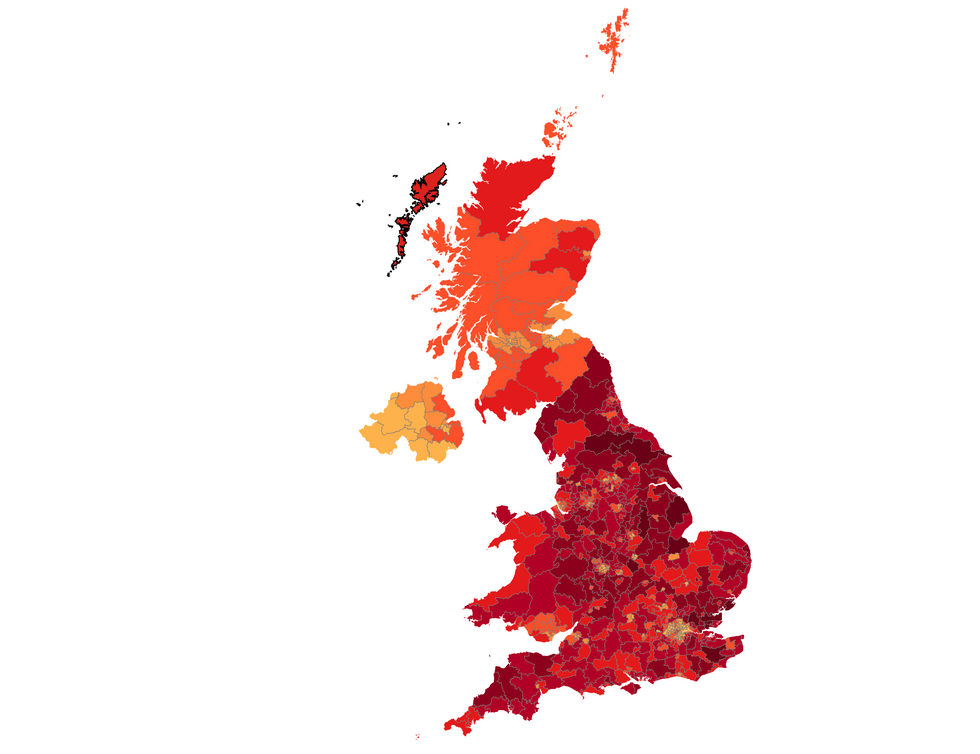A new map shows the number of people in marginally held Labour seats who signed the petition to call for an early General Election.
It comes as the election petition approaches three million signatures in less than a week of its initiation.
Voters have sent a resounding message to Starmer that they are disaffected with his premiership, which has been marred by allegations of “two-tier policing”, freebies and unpopular fiscal policies, such as the inheritance tax on farmers and winter fuel payments.
The petition is a psychological blow to Starmer as he tries to change the narrative, but it won’t make a material difference to his premiership.
Since it has passed 100,000 signatures, the petition will be considered for a debate in the House of Commons.
But the power to call a General Election ultimately lies with the Prime Minister. Even with millions of signatures, the PM could choose not to call an election.
He has also suggested as much. Asked about the petition on ITV’s This Morning on Monday, Starmer said: “There will be plenty of people who didn’t want us in the first place… my focus is on the decisions that I have to make every day.”
Cold comfort
Starmer is safe for now, but where these signatories are located suggests he could face an upset in 2029 and before then if by-elections are triggered.
The majority of signatures are concentrated in Reform UK or Conservative Party safe seats.
However, some of the highest concentrations can be found in constituencies where Labour MPs hold razor-thin majorities, the Petition Map shows.
Take David Pinto-Duschinsky, Labour MP for Hendon. He won his seat by just 15 votes on July 4, and 3,481 people in his constituency have signed the petition to call an election.

The majority of signatures are concentrated in Reform UK or Conservative Party safe feats
Petition Map
Neil Duncan-Jordan, MP for Poole might also be fretting: he pipped his rival to the post by 18 votes in the last election, but 5,171 of his constituents have expressed their disaffection with his government.
Likewise, Sam Carling, MP for Cambridgeshire North West, holds a slim majority of 39 seats and 5,508 constituents signed the petition.
Another MP who might be feeling the heat is Terry Jermy, Labour MP for South West Norfolk. He narrowly beat his closest competitor, former Prime Minister Liz Truss, by 630 votes, and his constituency has garnered more than 5,933 signatures.
He has encountered significant political pressure due to the recent farmers’ protests against changes in inheritance tax policy.
His constituency, with 408 registered farm holdings, has become a focal point for the recent farmers’ protests against changes in inheritance tax policy. He could be in for a thrashing at the next election.
Labour bigwigs are also in trouble. Jess Phillips, MP for Birmingham Yardley and Parliamentary Under-Secretary of State for Safeguarding and Violence Against Women and Girls, held onto her seat with just 693 votes. Now, 2,777 of her constituents are demanding an early election.
Health Secretary Wes Streeting also finds himself in hot water. He defeated Leanne Mohamad – a 24-year-old independent who ran on a Palestinian ticket – by just 528 votes. In his constituency of Ilford North, 2,684 people signed the petition.
Other marginal MPs in constituencies with thousands of signatures include:
- Andrew Pakes, MP forPeterborough, holds a slim majority of 118 votes to 3,706 signatures
- John Whitby, MP for Derbyshire Dales, holds a slim majority of 350 votes to 6,171 signatures
- Luke Myer, MP forMiddlesbrough South & East Cleveland, holds a slim majority of 214 votes to 5,290 signatures
- Matt Bishop, MP forForest of Dean, holds a slim majority of 278 votes to 4,742 signatures
- Kevin McKenna, MP for Sittingbourne & Sheppey, holds a slim majority of 355 votes to 6,247 signatures
- Ben Coleman, MP forChelsea & Fulham, holds a slim majority of 152 votes to 5,093 signatures
LATEST MEMBERSHIP DEVELOPMENTS

Labour leader Sir Keir Starmer will be mindful of his loveless landslide
PA
Bad omen
If this petition is a temperature gauge of the mood in Britain, Starmer should be worried.
He will be mindful of his loveless landslide and the volatility of the electoral map.
On July 4, Labour won a significant majority in Parliament with 412 seats out of 650, which translates to a supermajority.
However, when looking at the percentage of the voting population, only about 20 per cent of the total eligible voting population supported Labour – a lower percentage than those who voted for Jeremy Corbyn, the last Labour leader.
It was better understood as more of a protest vote against the Conservative Party, which experienced its worst defeat in nearly two centuries, than a thumping endorsement of Starmer’s vision for the future.
Insurgent parties also gained ground but failed to make a dent due to the first-past-the-post (FPTP) electoral system.
For instance, Reform UK, despite gaining only five seats, managed to secure around 14 per cent of the vote share, indicating a significant portion of the electorate’s support for parties outside the traditional two-party system.
This suggests Starmer is presiding over a fragmented Britain.